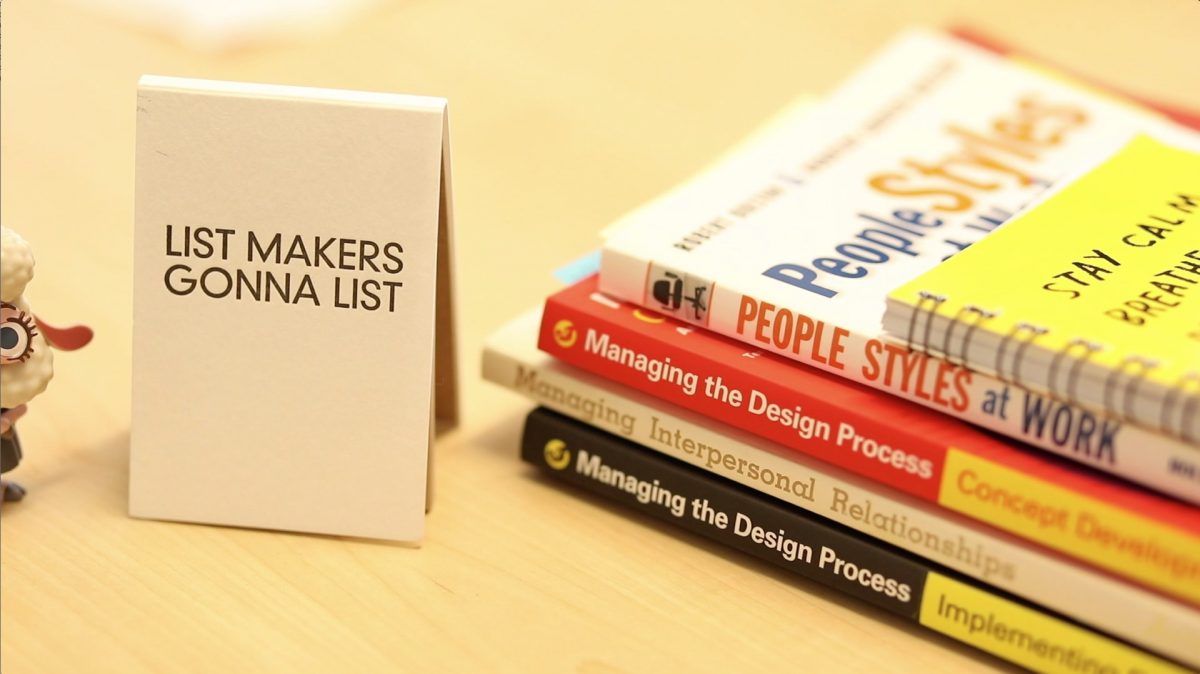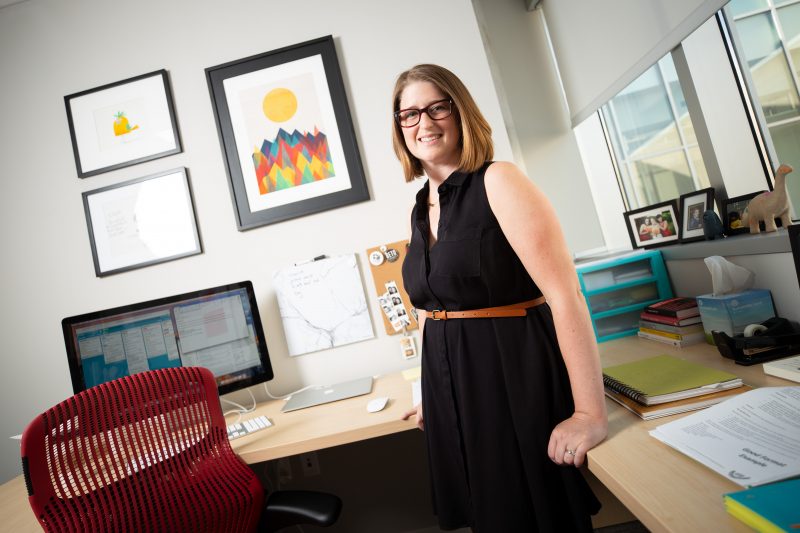If you’re a creative type, you’re probably familiar with the phrase, “The Muse is visiting.” If you’re unfamiliar with the Muses, they are the nine daughters of Zeus; goddesses who are regarded for inspiring creativity in the arts, literary forms, and science. If you’ve ever dropped by Senior Lecturer Kara Oropallo’s office in ATEC, you’ll find evidence that these creative forces keep regular appointments with her. Artist renderings, notepads with encouraging messages, and figurines from former projects are well-placed throughout her office, leaving none to doubt that Kara has a gift for taming creativity without bridling it.
Kara knows what it takes to be a creative in the workforce. After graduating from The Ohio State University, she joined the DreamWorks Animation (DWA) family. This career move gave her exposure in supervising talent in art, story and editorial, visual development, and animation production departments. During her time at DWA, she mastered the art of project management, helping to bring to life a variety of projects, such as Monsters vs. Aliens, Rise of the Guardians, The Croods, and most recently Trolls—all in twelve short years.
Utilizing a range of talents she’s honed that would make any muse jealous, through animation and live-action projects, employee relations management, and script evaluation Kara created and trained the DWA production team. Her program is still in use today.
“I’m really loving ATEC—I love being a part of this school at UT Dallas.”
In 2016, Kara’s career path would lead her to UT Dallas as an adjunct lecturer where she breathed life into an ATEC project management course that focuses on feature animation and has continued to develop its application to other disciplines and industries. She plans to continue to strengthen the project management course offerings to include aspects of animation, marketing, and video production.
Kara’s research asks many real-world management questions.
“How is creative project management different from other forms of management?” Kara discussed with us. “What is the best way to manage a creative project? What is the best way to manage designers?”
All questions she learned first-hand, on the job.

For recent graduates in the liberal arts, the post-graduation challenge isn’t limited to wondering when the Muse will visit and creativity will spark. The challenge is about finding employment; and the struggle is real. According to the National Center for Higher Education Management Systems and the Association of American Colleges and Universities, 55% of employers are interested in talent who possess skills and field-specific knowledge, as well as a more generalized range of knowledge and skills. In recent years, graduates have had to contend with a variety of trials in pursuit of launching their careers. Uncertainty on career direction, lack of soft skills, and minimal work experience are a few of the hurdles students face.
As a former production manager and now educator, Kara understands the need to produce functional graduates; those who can step into the workplace and hit the ground producing. Project management courses offer exceptional value to students by providing them with critical insight to the reality of joining the workforce. Effective communication and time management, for example, are seldom taught in college-settings. In most instances, students are expected to glean these skills throughout their college experience; leaving room for a vast interpretation of how these skills can be leveraged to optimize success.
In the Project Management for ATEC courses, Kara teaches “best practices that help creative individuals explore and reach that ‘special something’ that is so difficult to capture, but that they can do within the realistic budget and balance of a business.” She is also particularly interested in identifying students’ strengths and providing guidance on how they can translate their abilities into a career.
Kara shares that managing creative talent is not formulaic.
“I believe in managing people to achieve the goal of managing the product which is different than some studies of management in the past.”
“You need to have a goal, parameters, and that’s when you can really achieve your greatest work.”
Human-centric approaches, in her experience, works best when undertaking creative projects. In the classroom setting, this means outlining expectations and educating students on real-world scenarios. In her approach, creating an environment of inclusion and openness to peripheral experiences is also important, as bringing the greater human experience to the project is one of her goals.
“While you may be the one creating the art there are hopefully a lot of other people that will be digesting that art and looking at it through their own lens,” she shared.
While writing curriculum, Kara was inspired by an impressionable quote from her mother that has always stayed with her. “Everyone is thinking about themselves just like you are.” It is a quote that has driven her work ethic and perhaps a Muse-like message in its own right. If so, she’s listening: Kara is documenting her research and experiences in the classroom for a creative project of her own.
“I wanted to basically follow that quote from my mom…using that thematically to talk about how we work with creatives and how we can help creatives reach that vision while also keeping them on a realistic schedule and budget.”

Her research is not without its challenges. Creative management brings with it a set of unique concerns. The subjectivity of art, for example, can make it difficult to adhere to a timeline. Maintaining an atmosphere where both the creative team feels fulfilled and the vision of the project is not compromised is an important balance to uphold. Also, while communication and management of time are critical components to completing a project, the client’s satisfaction is key to success and creation.
Providing knowledge and strategies to become a successful creative is a part of the magic her classes teach. Perhaps the Muses can take a rest.
When Kara isn’t teaching, she enjoys reading books on communication, habits, and management, but also enjoys fiction. A volunteer with the Women Texas Film Festival, she and her husband often spend their weekends exploring with their three-year-old son and one-year-old daughter. While she jokes that her little ones provide her with an excuse to see animated films, we’re convinced it may be a pretext. Underneath her many roles, there is a possibility that Kara may be one of the Muses after all.


You must be logged in to post a comment.